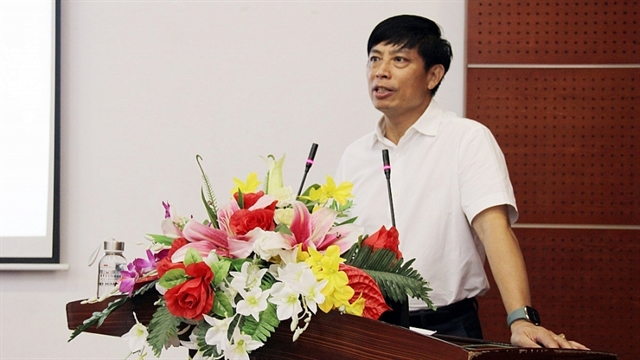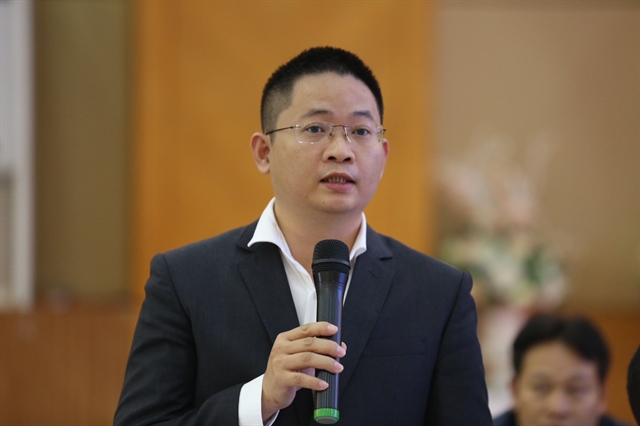The impacts of the pandemic has seriously affected traditional activities in business, distribution and export of Vietnamese agricultural products. Although this year's agricultural season is more difficult due to COVID-19 pandemic and social distancing, farmers still get a bumper harvest with good selling prices.
The COVID-19 pandemic has seriously affected the distribution and exports of Vietnamese agricultural products. Although this year's agricultural season is more difficult due to the pandemic and social distancing, farmers have still seen a bumper harvest with good selling prices.
In the current conditions, the distribution of farming products on e-commerce platforms is considered as an effective and sustainable solution to support farmers.
Six major e-commerce platforms are participating in a programme to sell lychees from Bac Giang online, as the province has been hit hard by the pandemic. Two of the platforms are Postmart and Voso.
Dang Hoang Hai, director of Viet Nam e-Commerce and Digital Economy Agency (IDEA) under the Ministry of Industry and Trade, Tran Trung Kien, director of Viettel Post E-commerce One Member Company Ltd (operating Voso) and Phan Trong Le, director of R&D – Branding Division, Vietnam Post (operating Postmart), speak with Viet Nam News reporter Vu Hoa about the issue.
What are your assessments of the effectiveness of selling farming products on e-commerce platforms?

Hai: Following Directive No 08/CT-BCT dated May 25, 2021 on creating favourable conditions in circulation and increasing support for consumption in the domestic market of local agricultural products in localities with large output and concentrated production amid the complicated development of the COVID-19 pandemic, the IDEA was assigned to act as the focal point in directing and guiding e-commerce platforms to help sellers and traders to participate in their platforms. They have also supported and given priority to agriculture traders participating in the 'National Online Store'.
IDEA has rushed to work with six big e-commerce platforms in Viet Nam including Sendo, Voso (Viettel Post), Tiki, Shopee, Postmart (Vietnam Post) and Lazada to have plans for purchasing, logistics and advertising to meet all lychee orders. Transport has been implemented in different methods from refrigerated trucks to air freight with good preservation to bring the highest quality lychees to consumers.
From the early days of June, Luc Ngan lychee in Bac Giang Province for the first time was distributed in a systematic and organised manner on all six major e-commerce platforms. The 'Bac Giang Lychee Festival' was held on June 8.
In the context of the complicated situation of the pandemic, connecting the consumption of agricultural products on a digital platform is an effective solution and an extension of the traditional product distribution method, helping farmers expand their consumption markets throughout 63 provinces and cities, taking advantage of technology following the Industry 4.0 trend.
E-commerce platforms have directly purchased or distributed the products. They also accompany and promote images and livestreams from gardens to promote lychee consumption. An e-commerce platform said within 12 hours of opening for sale, they received orders for more than 30 tonnes of lychee via online channels.
This year, there is effective co-ordination between online and offline channels to not only save operating and logistics costs but also increase the distribution of Bac Giang lychees. This is demonstrated through the combination of BigC/Go with Tiki, Vinmart, FoodMap with Lazada, and Viettel Post with Voso.

Kien: At first, people were quite sceptical about buying and selling online. However, after joining the e-commerce platform, Voso has received positive signals from farmers. Many households have asked Voso to put their products on the platform. Since the beginning of the year, Voso has put 3,727 suppliers on the platform, up 586 per cent compared to the same period in 2020.
Compared with the traditional sales method, the promotion of local products on e-commerce site creates more open business opportunities. Farmers do not depend on traders but can bring local specialities to consumers at home and abroad as quickly as possible.
On e-commerce platforms, sellers and buyers are supported in terms of providing multi-dimensional product information, images and certifications, flexible payment methods, and door-to-door shipping nationwide to provide convenience and save time. At Voso, buyers and sellers can easily connect to each other. All information on the origin of agricultural products will be fully posted on the platform to help customers feel more secure when purchasing online.
Le: Postmart launched its programme to support farmers in Bac Giang Province selling their lychees on May 19. At that time, there were 1,000 to 2,000 orders a day on e-commerce platforms. However, in recent days, sales have been on a surge with up to 10,000-12,000, bringing the total amount to 40 to 50 tonnes a day. I highly value the effectiveness of the programme which helps farmers have another consumption channel during the complicated changes of the COVID-19 pandemic. The e-commerce platforms also help Vietnamese consumers access farming products online.
With a wide network, Vietnam Post will support farmers in lychee consumption in both domestic and international markets. We have vehicles to transport from pandemic areas to all parts of the country while still ensuring safety and fresh quality for consumers. We will also support lychee consumption through some foreign markets such as Japan and Australia to support people in this pandemic situation.
Do farmers have any difficulties in approaching this new method?
Hai: Lychee growers in Bac Giang Province excitedly said this was the first time they knew about this modern sales model. There were many surprises and anxiety. Experts from e-commerce platforms and officials of the Provincial Youth Union have supported and guided people to step by step approach to new sale methods. Now, selling online is not as difficult as in the past. However, this work needs to be done on a regular basis, with the right techniques to increase the effectiveness and spread in the community.

Kien: Most farmers have not used smartphones, the minimum tool to participate in online sales. We are ready to support them to open and operate the stall online for the first time, then hand it over to farmers to sell proactively.
We also have staff to help farmers create orders, take photos of products, post them for sale, and livestream on e-commerce websites. We accompany people throughout the process of trading on the platform.
The technological capacity of our farmers is still limited. However, at this time, our strategy is to focus on training and guiding young production households and co-operatives who are people with high capacity to learn faster and have stronger determination. In the near future, these people would be able to spread their knowledge and skills about technology in their community.
In addition, we realised there are still many farmers who are not really ready to do business in a new form but still want to follow the traditional way. However, those are just initial problems. Most farmers whose products are put on the e-commerce floors are now familiar with the operations and realise the advantages of the new method.
Le: The first difficulty is the farmers’ habits. Previously, they harvested in large quantities to sell to traders. Now they must get in the habit of taking on small quantities, use a different form of preservation and learn to advertise on digital platforms.
Secondly, difficulties also come from logistics and distribution enterprises as they have to ensure the freshness of lychees after the harvest, especially in the hot season. It is necessary to have tools to keep the products fresh for consumers.
Thirdly, consumers must have a choice of products with guaranteed quality. Buying goods on digital platforms will change the habit that we can order at home instead of going to the market, especially in the context of COVID-19.
Will the sale of farming products on e-commerce platforms be a short-term solution or a long-term step to create sustainable distribution channels for localities?
Hai: Under the framework of the National E-commerce Development Programme, the IDEA at the end of 2019 signed a strategic co-operation agreement with Voso and Viettel Post and with Tiki at the end of 2020 to build a 'Vietnamese online store' on e-commerce platforms. IDEA in collaboration with the Department of Domestic Market has implemented the 'Vietnamese people give priority to using Vietnamese goods' programme which has had a strong spillover effect in the domestic market.
The programme has been strongly implemented nationwide with support from leaders of localities, departments and businesses. One year after launching, there were thousands of businesses accessing the programme. Hundreds of products were carefully chosen and sold.
The programme's coverage is very wide and highly appreciated by the business community across the country. The programme to connect e-commerce in Quang Ninh, Bac Giang, central provinces and the Mekong Delta region will be implemented in the near future.
Selling farming products on e-commerce platforms is not a temporary solution, but a long-term one, creating a new distribution business tool for enterprises and agricultural co-operatives to approach and manage customers directly step by step, as well as do business and expand markets across all 63 provinces.
Kien: Currently, we are participating in a Government project to create a family brand for farmers. This is one of the important elements of sales, then farmers will not need to depend on a third party but completely control prices, creating a new business channel to bring them a more stable consumption channel.
Voso will train people on selling skills. Specifically, we will guide them on how to price products and sell their products both on online and offline platforms. We want to give people a fishing rod, not a fish. With the goal of digital transformation for all Vietnamese farmers, they will no longer stop at production but can distribute their agricultural products. In addition, farmers will understand market demands to be more proactive in production and not depend on traders.
Le: The selling of lychees and other Vietnamese seasonal agricultural products on e-commerce platforms is a long-term, methodical strategy. Selling Bac Giang’s lychees on the platforms is just the first test. The consumption of Vietnamese agricultural products has always been dependent on weather, the seasons and foreign consumption needs. If we have a good direction, gathering the needs of people from all over the world through a digital platform, it will be the shortest possible approach to resolve the issue. It is a long-term strategy because currently the logistics serving Vietnamese agriculture is not good. E-commerce will make the supply chain of logistics services in Viet Nam improve in terms of quality. The supply chain for agricultural products and seafood is the most difficult factor. If we can do this, the Vietnamese market with more than 90 million people will become a very good market as well as for the country's exports.
What are the barriers to selling agricultural products on e-commerce platforms? What are your solutions to remove these barriers?
Kien: Agricultural products are difficult to preserve with a short shelf life and changing prices day by day. The preservation and transportation of the products are also much more difficult than other items such as household appliances, dry goods or electronic equipment.
In addition, most farmer households still work in a fragmented fashion instead of a large model. The product quality is not uniform while the packaging and preservation process is still poor.
This is why we have worked with co-operatives to standardise the production process, product quality standards and increase goods value before supplying to the market. The co-operatives act as the nucleus to spread the model to farmers.
In addition, we also work with reputable domestic and international organisations to organise training sessions to show people the importance of e-commerce sales as well as how to sell effectively.
Le: The first difficulty is to ensure product quality. Farmers often finish harvesting and selling and do not pay attention to quality assurance throughout all shipments. This is why initial batches have good quality but later have some problems. Postmart has to learn about lychee selection, cutting, packaging, and preservation techniques. In case farmers are not proficient with the techniques, we will guide them. Previously, farmers only sold lychees to traders. Now they have more skills to cut, preserve and pack to ensure the same quality for lychee batches.
The second problem is related to prices because in the same garden there are different qualities. The e-commerce platforms must regularly inform to regularly update prices in accordance with the market every hour. — VNS
|
Teleconference discusses consumption of Bac Giang lychees A teleconference linking 29 locations at home and abroad was held on Tuesday to discuss lychee consumption this year. The gathering was organised by the Bac Giang provincial People’s Committee, the Ministry of Industry and Trade, and the Ministry of Agriculture and Rural Development. Addressing the conference, Minister of Industry and Trade Nguyen Hong Dien hailed Bac Giang for selling lychees via e-commerce platforms, saying this is the right approach amid the COVID-19 pandemic. The Bac Giang lychee trademark is currently protected in China, the US, Japan, Australia, the Republic of Korea, Singapore, Laos, and Cambodia. Earlier, in March, it became the first Vietnamese farm produce to receive geographical indication protection in Japan, paving the way for it to enter other promising markets. Chairman of the provincial People’s Committee Le Anh Duong said Bac Giang has identified three scenarios for selling lychees this year while working with foreign partners and cities, provinces, and merchants to sell other farm produce. More than 1,500 trucks together with workers are ready to transport and sell lychees, he added, saying sales have proceeded smoothly so far. Bac Giang’s lychee output is estimated at 180,000 tonnes this year. As of June 7, more than 53,000 tonnes had been sold. On the occasion, a ceremony was also held to announce a certificate of geographical indication from Japan for Luc Ngan lychees, while stalls selling local lychees were also launched on domestic and foreign e-commerce platforms. — VNS
|





